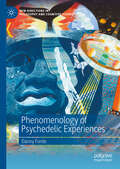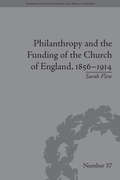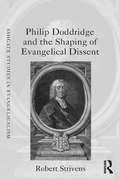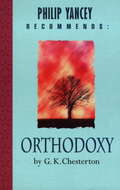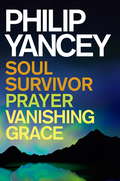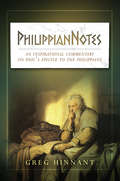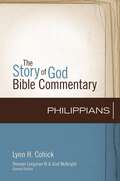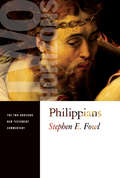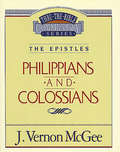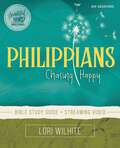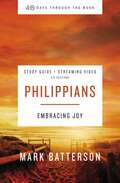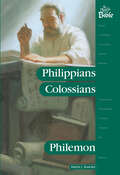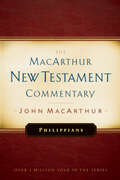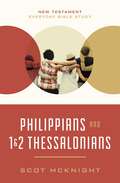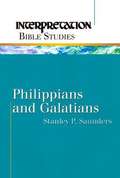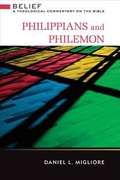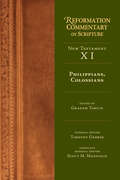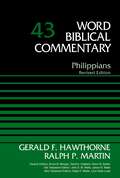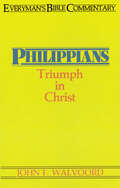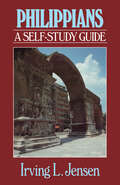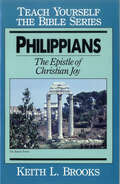- Table View
- List View
Phenomenology of Psychedelic Experiences (New Directions in Philosophy and Cognitive Science)
by Danny FordeThis book provides a phenomenological examination of the psychedelic experience. Danny Forde begins by introducing and outlining both the subject matter (psychedelics) and the approach (phenomenology). In the phenomenological analysis, Forde defends a bundle of four interconnected claims. The first thesis is that a minimal sense of self is maintained even during the most turbulent experiences of ego-dissolution. This leads into the second thesis, which argues that rather than being purely hallucinatory, the psychedelic experience can reveal aspects of reality which would not otherwise be disclosed, i.e., as the ego dissolves one gains a view of the world which Forde calls ego-free seeing. The third thesis is that the psychedelic experience can open the subject to the essential nature of reality. Here, Forde claims that the mythopoetic archetypical phenomena encountered during the peak of the psychedelic experience are best comprehended in terms of essences. Finally, Forde argues that the psychedelic experience is a bona fide transformative experience and offers a distinct way of apprehending the Ground of Being.
Philanthropy and the Funding of the Church of England, 1856–1914 (Perspectives in Economic and Social History #37)
by Sarah FlewThe changing relationship between the church and its supporters is key to understanding changing religious and social attitudes in Victorian Britain. Using the records of the Anglican Church’s home-missionary organizations, Flew charts the decline in Christian philanthropy and its connection to the growing secularization of society.
Philip Doddridge and the Shaping of Evangelical Dissent (Routledge Studies in Evangelicalism)
by Robert StrivensEvangelical Dissent in the early eighteenth century had to address a variety of intellectual challenges. How reliable was the Bible? Was traditional Christian teaching about God, humanity, sin and salvation true? What was the role of reason in the Christian faith? Philip Doddridge (1702-51) pastored a sizeable evangelical congregation in Northampton, England, and ran a training academy for Dissenters which prepared men for pastoral ministry. Philip Doddridge and the Shaping of Evangelical Dissent examines his theology and philosophy in the context of these and other issues of his day and explores the leadership that he provided in evangelical Dissent in the first half of the eighteenth century. Offering a fresh look at Doddridge’s thought, the book provides a criticial examination of the accepted view that Doddridge was influenced in his thinking primarily by Richard Baxter and John Locke. Exploring the influence of other streams of thought, from John Owen and other Puritan writers to Samuel Clarke and Isaac Watts, as well as interaction with contemporaries in Dissent, the book shows Doddridge to be a leader in, and shaper of, an evangelical Dissent which was essentially Calvinistic in its theology, adapted to the contours and culture of its times.
Philip Yancey Recommends: Orthodoxy
by G K Chesterton'Why anyone would pick up a book with that formidable title eludes me,' writes Philip Yancey of G. K. Chesterton's Orthodoxy. 'But one day I did so and my faith has never recovered. I was experiencing a time of spiritual dryness in which everything seemed stale, warmed over, lifeless. Orthodoxy brought freshness and, above all, a new spirit of adventure.''We direly need another Chesterton today, I think. In a time when culture and faith have drifted even further apart, we could use his brilliance, his entertaining style, and above all his generous and joyful spirit. He managed to propound the Christian faith with as much wit, good humour and sheer intellectual force as anyone in this century.'Since its first publication in 1908, this classic work has represented a pivotal step in the adoption of a credible faith by many other Christian thinkers, including C. S. Lewis. Written as a spiritual autobiography, it stands as a remarkable and inspirational apologetic for Christianity.
Philip Yancey Recommends: Orthodoxy
by G K Chesterton'Why anyone would pick up a book with that formidable title eludes me,' writes Philip Yancey of G. K. Chesterton's Orthodoxy. 'But one day I did so and my faith has never recovered. I was experiencing a time of spiritual dryness in which everything seemed stale, warmed over, lifeless. Orthodoxy brought freshness and, above all, a new spirit of adventure.''We direly need another Chesterton today, I think. In a time when culture and faith have drifted even further apart, we could use his brilliance, his entertaining style, and above all his generous and joyful spirit. He managed to propound the Christian faith with as much wit, good humour and sheer intellectual force as anyone in this century.'Since its first publication in 1908, this classic work has represented a pivotal step in the adoption of a credible faith by many other Christian thinkers, including C. S. Lewis. Written as a spiritual autobiography, it stands as a remarkable and inspirational apologetic for Christianity.
Philip Yancey: Soul Survivor, Prayer, Vanishing Grace
by Philip YanceyYancey's lifelong writing career has always focused on the search for honest faith that makes a visible difference for a world in pain. In his landmark book What's So Amazing about Grace? he issued a benchmark call for Christians to be as grace-filled in their behaviour as they are in asserting their beliefs.This collection sets out Yancey's search for a life enhanced by faith instead of diminished by religion. Having struggled to forge personal convictions about God amid the ironies of life and the incongruities of religion, he looks closer at those whose lives radiate spiritual authenticity rather than pious posturing.From Dostoevsky to Martin Luther King, G. K. Chesterton to Paul Brand, Yancey pays homage to some of the most remarkable, selfless, Christ-like lives our world has known, and asks what both he and we can do to find such beautiful faith in our own lives. Multi-award winning spirituality writer Philip Yancey is loved throughout the world for his honest, insightful and inspirational writing.
PhilippianNotes: A Commentary on Paul's Epistle to the Philippians
by Greg HinnantGreg Hinnant, one of Creation House&’s most prolific authors, presents an intimate exposition of the Book of Philippians, thoroughly exploring its author, audience, and historical context. PhilippianNotes strikes the right balance, offering content that is both theologically precise and emotionally stirring, making this commentary a valuable resource for pastors and teachers and a very understandable and motivational study for every believer. As with all his books, Hinnant&’s teaching tone is respectful, personal, and pastoral. He has approached this epistle with devotion and scholarship, interweaving his personal insights with the collective wisdom of a host of Christian writers, scholars, and theologians. Numerous biblical references and thought-provoking footnotes are provided for those desiring further study. PhilippianNotes is a uniquely insightful, informative, and moving tapestry of transformational truth and wisdom. It will deepen your appreciation for the apostle Paul, his teachings, and all that God accomplished in and through him—and desires to do in and through us.
Philippians (The Story of God Bible Commentary)
by Tremper Longman III Scot Mcknight Lynn H. CohickEmphasizing the historical distance between the New Testament and contemporary culture, Philippians—part of the new, highly-anticipated Fidei Commentary series on the New Testament—provides pastors, students, Sunday School teachers, and lay people a clear and compelling exposition of the text in the context of the Bible’s overarching story. The authors move away from “application” language, which has been criticized as being too simplistic, instead encouraging discussion of how the Bible’s story can be lived today. Offering a new type of application commentary for today’s context, the Fidei series explains and illuminates Scripture as God’s Story, with each New Testament text examined as embedded in its canonical and historical setting, in order to foster discernment in living the story faithfully and creatively with and for the Church in the 21st Century
Philippians (The Two Horizons New Testament Commentary)
by Stephen E. FowlIn this fine new commentary on Paul's letter to the Philippians, Stephen Fowl notes that for the great premodern commentators of the Christian tradition, the literal sense of Scripture is always regulated by theological concerns. Thus, unlike commentaries that simply append theology to historical criticism, Fowl's volume displays disciplined attention to the text of Philippians in ways that enhance rather than frustrate theological inquiry. While Fowl engages the great scholars of the past, John Chrysostom and Thomas Aquinas among them, he also draws a novel theology of friendship from Paul's letter and unpacks how the teachings of Philippians might be embodied today by Christians in the West.
Philippians / Colossians: The Epistles (Thru the Bible)
by J. Vernon McgeeRadio messages from J. Vernon McGee delighted and enthralled listeners for years with simple, straightforward language and clear understanding of the Scripture. Now enjoy his personable, yet scholarly, style in a 60-volume set of commentaries that takes you from Genesis to Revelation with new understanding and insight. Each volume includes introductory sections, detailed outlines and a thorough, paragraph-by-paragraph discussion of the text. A great choice for pastors - and even better choice for the average Bible reader and student! Very affordable in a size that can go anywhere, it's available as a complete 60-volume series, in Old Testament or New Testament sets, or individually.
Philippians Bible Study Guide plus Streaming Video: Chasing Happy (Beautiful Word Bible Studies)
by Lori WilhiteDISCOVER THE HAPPINESS YOU&’VE BEEN CHASINGMany of us spend our lives chasing happy through relationships, success, and the next adventure. Yet, we only discover a dryness in our souls. Why? Because we&’re chasing the wrong kind of happy. We chase temporary happiness instead of the eternal happiness found in Jesus.Sometimes, we wonder if God wants us to be happy. Someone said that God cares more about our holiness than our happiness like the two are disconnected. But what if the pursuit of happiness was adjacent to the pursuit of holiness?The problem isn&’t that God doesn&’t want us to be happy. The problem is that we&’re chasing happy in the wrong things. Happiness is ours when we chase God&’s joy, His purpose, His unity, His contentment, and His peace. Happy is captured when we chase Him.If you&’ve ever struggled with laying hold of true happiness, this study is for you! Discover the incredible truth that happy isn&’t found in the circumstances around us, but the power of Jesus in us.This study guide includes:Individual access to six streaming video talks from LoriGroup discussion questions and an opening group activity for each sessionIn-depth personal Bible study between sessionsReading plan through the entire book of PhilippiansScripture memory cards and coloring pagesSESSIONS AND VIDEO RUN TIMES:Chasing Joy (24:00)Chasing Purpose (21:30)Chasing Unity (23:00)Chasing Jesus (21:30)Chasing Peace (21:30)Chasing Contentment (20:00)This study guide has everything you need for a full Bible study experience, including:The study guide itself—with discussion and reflection questions, video notes, and a leader's guide.An individual access code to stream all video sessions online. (You don&’t need to buy a DVD!)Streaming video access code included. Access code subject to expiration after 12/31/2028. Code may be redeemed only by the recipient of this package. Code may not be transferred or sold separately from this package. Internet connection required. Void where prohibited, taxed, or restricted by law. Additional offer details inside.
Philippians Bible Study Guide plus Streaming Video: Embracing Joy (40 Days Through the Book)
by Mark BattersonJoy is everywhere in the book of Philippians. The emotion that Paul poured out in his letter to the church in Philippi shines through in every one of its 104 verses...and Paul wrote it as a prisoner chained to a Roman guard. What gives the Apostle Paul such resounding joy, even in the face of suffering and persecution? In this six-session study (streaming video included), bestselling author and pastor Mark Batterson serves as a tour guide on the letter to the Philippians; uncovering the major themes of joy, gratitude, unity, and purpose found in this inspiring letter.This study guide has everything you need for a full Bible study experience, including:The study guide itself—a 40 Day reading plan through Philippians with discussion and personal reflection questions, video notes, and a leader's guide.An individual access code to stream all six video sessions online (you don't need to buy a DVD!).The heartbeat of Philippians is for believers to have a Jesus-centered vision of life: a radical vision that, when seen fully, enables us to embrace joy no matter the circumstances.40 Days Through the Book series:Each of the studies in this series, taught by a different pastor or Bible teacher on a specific book of the Bible, is designed to help you more actively engage with God's Word by understanding its background and culture and applying it in a fresh way to your life. Throughout each study, you'll be encouraged to read through the corresponding book in the New Testament at least once during the course of 40 days. Streaming video access code included. Access code subject to expiration after 12/31/2027. Code may be redeemed only by the recipient of this package. Code may not be transferred or sold separately from this package. Internet connection required. Void where prohibited, taxed, or restricted by law. Additional offer details inside.
Philippians Colossians Philemon (The People's Bible)
by Harlyn J KuschelWhat is the book of Philippians about in the Bible? What is the book of Colossians about in the Bible? Who was Philemon?The apostle Paul wrote these books of the Bible while he was in prison. Philippians is a warm, personal letter expressing great joy in Christ. Paul wrote to the Colossians to help them understand Christian truth and ward off false teaching. Philemon is a short note to Paul’s friend, asking him to forgive a runaway slave who had become a Christian.Want to learn more? If you’re wondering what the books of Philippians, Colossians, and Philemon are all about, this helpful resource is for you!Philippians, Colossians, Philemon is a reliable Bible commentary. It’s down to earth, clearly written, easy to read and understand, and filled with practical and modern applications to Scripture.It also includes the complete text of the books of Philippians, Colossians, and Philemon from the NIV Bible. The Christ-centered commentaries following the Scripture sections contain explanations of the text, historical background, illustrations, and archaeological information. Philippians, Colossians, Philemon is a great resource for personal or group study!This book is a part of The People’s Bible series from Northwestern Publishing House.
Philippians MacArthur New Testament Commentary: Christ, The Source Of Joy And Strength (MacArthur New Testament Commentary Series #21)
by John MacArthurPhilippians is the most personal letter Paul wrote to a church. In it, he addresses many challenging aspects of the Christian life such as joy, humility, and spiritual unity. Respected preacher and Bible teacher, John MacArthur, presents yet another comprehensive and compelling commentary in his New Testament Series. Readers will find this resource indispensable for their study of this excellent epistle.
Philippians MacArthur New Testament Commentary: Christ, The Source Of Joy And Strength (MacArthur New Testament Commentary Series #21)
by John MacArthurPhilippians is the most personal letter Paul wrote to a church. In it, he addresses many challenging aspects of the Christian life such as joy, humility, and spiritual unity. Respected preacher and Bible teacher, John MacArthur, presents yet another comprehensive and compelling commentary in his New Testament Series. Readers will find this resource indispensable for their study of this excellent epistle.
Philippians and 1 and 2 Thessalonians: Kingdom Living in Today’s World (New Testament Everyday Bible Study Series)
by Scot McKnightBecome a daily Bible reader, attentive to the mind of God."Scot McKnight is one of my absolute favorite New Testament scholars and his Everyday Bible Study series is akin to Einstein creating a user-friendly version of the Theory of Relativity!"—Lisa Harper, award-winning author and Bible teacherIn the New Testament Everyday Bible Study Series, widely respected biblical scholar Scot McKnight reveals the newness and activeness of God's Word as it works in our everyday lives. His unique approach to Bible study combines sound theology with relevant pastoral wisdom. Each volume of this series provides:Original Meaning: Brief, precise expositions of the biblical text and offers a clear focus for the central message of each passage.Fresh Interpretation: Brings the passage alive with fresh images and what it means to follow King Jesus.Practical Application: Biblical connections and questions for reflection and application for each passage.Ideal for personal reflection or group study, Philippians and 1 and 2 Thessalonians will help you see God in the biblical context so you can hear from God in your context. Philippians and the Thessalonians address believers in the first century and in the twenty-first century with words that are practical and deeply spiritual:Philippians appeals for unity and rejoicing in the face of suffering.1 and 2 Thessalonians emphasize having a heart of thanksgiving and discuss the return of Christ. Kingdom living is the shape of life in Christ. These letters have taught Christians since the first century to live a life shaped by confidence in what God has promised us, but also to live that life without trying to escape from this world.Exploring the links between the time these words were written and our own times, Scot McKnight uncovers the enduring relevance and importance of these three letters for our lives today. He&’ll walk you and your group through the books with Scripture passages (sometimes translated from the original by McKnight himself), reflection questions, pastoral insights, and ideas for putting God&’s words into action.
Philippians and Galatians
by Stanley P. SaundersThe letters to the Philippians and to the Galatians both illustrate the passion and intesnity fo Paul's writing. The letter to the Philappians is perhaps Paul's warmest letter, using the language of partnership, joy and humility. Galatians, in contrast, reveals frustion and anger and lacks the expression of thanksgiving typically found near the beginning of Paul's letters. Together these writings provide a compelling portrait of a theologian of rare power and insight whose legacy continues to spark lively debate in the church today.
Philippians and Philemon
by Daniel L. MiglioreIn this latest volume in the Belief series, Daniel L. Migliore plumbs the depth of Paul's letters to the Philippians and to Philemon. With splendid theological reflection, Migliore explores central themes of these remarkable letters--themes that include the practice of prayer, righteousness from God, and the work of reconciliation and transformation through Jesus Christ. Migliore shows how Philippians continues to speak to churches that, like the church at Philippi, struggle to be faithful to Christ, worry about the future, and need guidance. And in Philemon, Migliore finds a letter with importance far beyond its size--a letter that can enrich our understanding of the fullness of the gospel that Paul proclaims. In both books, Migliore deftly shows Paul as a remarkable theologian and pastor with a message instructive to the church of every age.
Philippians, Colossians (Reformation Commentary on Scripture Series #Nt Volume 11)
by Graham TomlinPreachingPaul's letters to the Philippians and Colossians celebrate the glory and supremacy of Jesus Christ and his saving work, a refrain that the reformers never grew tired of singing. While their tones are diverse, the clarity of their compositions and the power of their voices still reverberate today.Reformation commentators found the main themes of these Pauline letters deeply applicable to their circumstances, and volume editor Graham Tomlin urges that they are just as relevant to our own: Philippians overflows with thanksgiving in the midst of persecution and trials; Colossians defends the superiority of Jesus as Lord over all principalities and powers. For the Reformers as well as for Paul, all goodness and grace flows from Christ in whom "all the fullness of God was pleased to dwell" (Col 1:19), the Son who "made himself nothing" (Phil 2:7) in order to bring many daughters and sons to glory.This volume assembles a diverse chorus spanning place, time, and confessional differences: from Italian Reform-minded Catholic Gasparo Contarini and German Lutheran Martin Chemnitz, to Dutch Anabaptist Menno Simons, to French Reformed Theodore Beza and English Puritan Richard Sibbes. Scholars and pastors alike will find many fruitful insights from these and a number of other significant figures--most of whom enjoy fresh translations from the original, many for the first time in English.
Philippians, Volume 43: Revised Edition (Word Biblical Commentary)
by Bruce M. Metzger Ralph P. Martin Lynn Allan Losie David Allen Hubbard Glenn W. Barker John D. Watts James W. Watts Gerald F. HawthorneThe Word Biblical Commentary delivers the best in biblical scholarship, from the leading scholars of our day who share a commitment to Scripture as divine revelation. This series emphasizes a thorough analysis of textual, linguistic, structural, and theological evidence. The result is judicious and balanced insight into the meanings of the text in the framework of biblical theology. These widely acclaimed commentaries serve as exceptional resources for the professional theologian and instructor, the seminary or university student, the working minister, and everyone concerned with building theological understanding from a solid base of biblical scholarship. <P><P>Overview of Commentary Organization Introduction—covers issues pertaining to the whole book, including context, date, authorship, composition, interpretive issues, purpose, and theology.Each section of the commentary includes:Pericope Bibliography—a helpful resource containing the most important works that pertain to each particular pericope. Translation—the author’s own translation of the biblical text, reflecting the end result of exegesis and attending to Hebrew and Greek idiomatic usage of words, phrases, and tenses, yet in reasonably good English.Notes—the author’s notes to the translation that address any textual variants, grammatical forms, syntactical constructions, basic meanings of words, and problems of translation.Form/Structure/Setting—a discussion of redaction, genre, sources, and tradition as they concern the origin of the pericope, its canonical form, and its relation to the biblical and extra-biblical contexts in order to illuminate the structure and character of the pericope. <P>Rhetorical or compositional features important to understanding the passage are also introduced here.Comment—verse-by-verse interpretation of the text and dialogue with other interpreters, engaging with current opinion and scholarly research.Explanation—brings together all the results of the discussion in previous sections to expose the meaning and intention of the text at several levels: (1) within the context of the book itself; (2) its meaning in the OT or NT; (3) its place in the entire canon; (4) theological relevance to broader OT or NT issues.General Bibliography—occurring at the end of each volume, this extensive bibliography contains all sources used anywhere in the commentary.
Philippians- Everyman's Bible Commentary: Triumph In Christ (Everyman's Bible Commentaries)
by John WalvoordIt seems unlikely that a chained prisoner would write a paper on triumph, but in his letter to the Philippian believers, the apostle Paul did exactly that. John F. Walvoord's refreshing analysis of this popular New Testament epistle combines an unusually fascinating style with a careful exegesis of the original Greek text. After discussing the epistle's authorship, date, character, and relevance to modern Christianity, Walvoord moves to a consideration of prominent phrases in the Pauline writings. Additionally, cross-references and historical background help to explain the text to the layman or student. Learn how the principles expressed by the apostle Paul can help Christians today to consistently experience peace in Christ.
Philippians- Everyman's Bible Commentary: Triumph In Christ (Everyman's Bible Commentaries)
by John WalvoordIt seems unlikely that a chained prisoner would write a paper on triumph, but in his letter to the Philippian believers, the apostle Paul did exactly that. John F. Walvoord's refreshing analysis of this popular New Testament epistle combines an unusually fascinating style with a careful exegesis of the original Greek text. After discussing the epistle's authorship, date, character, and relevance to modern Christianity, Walvoord moves to a consideration of prominent phrases in the Pauline writings. Additionally, cross-references and historical background help to explain the text to the layman or student. Learn how the principles expressed by the apostle Paul can help Christians today to consistently experience peace in Christ.
Philippians- Jensen Bible Self Study Guide (Jensen Bible Self-Study Guide Series)
by Irving L. JensenThis self-study guide will introduce you to the church at Philippi, where Paul maintained a close and unique relationship with the people who supported him spiritually and financially. Out of a heart of gratitude he wrote them a thank-you letter while imprisoned at Rome. In it Paul describes one of the most important and poignant teachings regarding Jesus Christ. In the second chapter he discusses kenosis—the self-imposed humiliation that typified the life of the Lord as a humble servant, whose obedience went as far as an undeserved sacrificial death for humanity.If you are looking for a comprehensive, challenging tool to use in personal, group, or class Bible study, you will find the Jensen Bible Self-Study series an exciting way to better understand the important truths of God's Word. Each response-oriented guide in the 39-book series features helpful charts, graphs, maps, and ideas for projects and further study. You will refer back to each completed guide as a reference again and again as you study the Scriptures. This study series has enabled millions to effectively explore and understand God's eternal message, and it continues to be a widely-used tool for Bible study today.
Philippians- Jensen Bible Self Study Guide (Jensen Bible Self-Study Guide Series)
by Irving L. JensenThis self-study guide will introduce you to the church at Philippi, where Paul maintained a close and unique relationship with the people who supported him spiritually and financially. Out of a heart of gratitude he wrote them a thank-you letter while imprisoned at Rome. In it Paul describes one of the most important and poignant teachings regarding Jesus Christ. In the second chapter he discusses kenosis—the self-imposed humiliation that typified the life of the Lord as a humble servant, whose obedience went as far as an undeserved sacrificial death for humanity.If you are looking for a comprehensive, challenging tool to use in personal, group, or class Bible study, you will find the Jensen Bible Self-Study series an exciting way to better understand the important truths of God's Word. Each response-oriented guide in the 39-book series features helpful charts, graphs, maps, and ideas for projects and further study. You will refer back to each completed guide as a reference again and again as you study the Scriptures. This study series has enabled millions to effectively explore and understand God's eternal message, and it continues to be a widely-used tool for Bible study today.
Philippians- Teach Yourself the Bible Series: The Epistle of Christian Joy (Teach Yourself the Bible)
by Keith BrooksThe Teach Yourself the Bible Series is one of the best New Testament studies you will find anywhere. Each book in the series is packed full of valuable questions on individual chapters of the Bible, check-ups to test your grasp of scriptural truths, and usable suggestions for group study.Grow in your knowledge of God through each New Testament book, then go on to study six aspects of Christianity essential for all believers: doctrine, prayer, eternal life, prophecy, Christian character, and Bible study.The church at Philippi was Paul's first established in Europe and one for whom he felt special affection. Study this warm letter to the Philippian believers and learn from the problems they encountered as a growing congregation.Strengthen your relationship with the living God with all twenty-five books of the Teach Yourself the Bible Series. Each volume is a timeless, yet practical, study of the Word of God.
